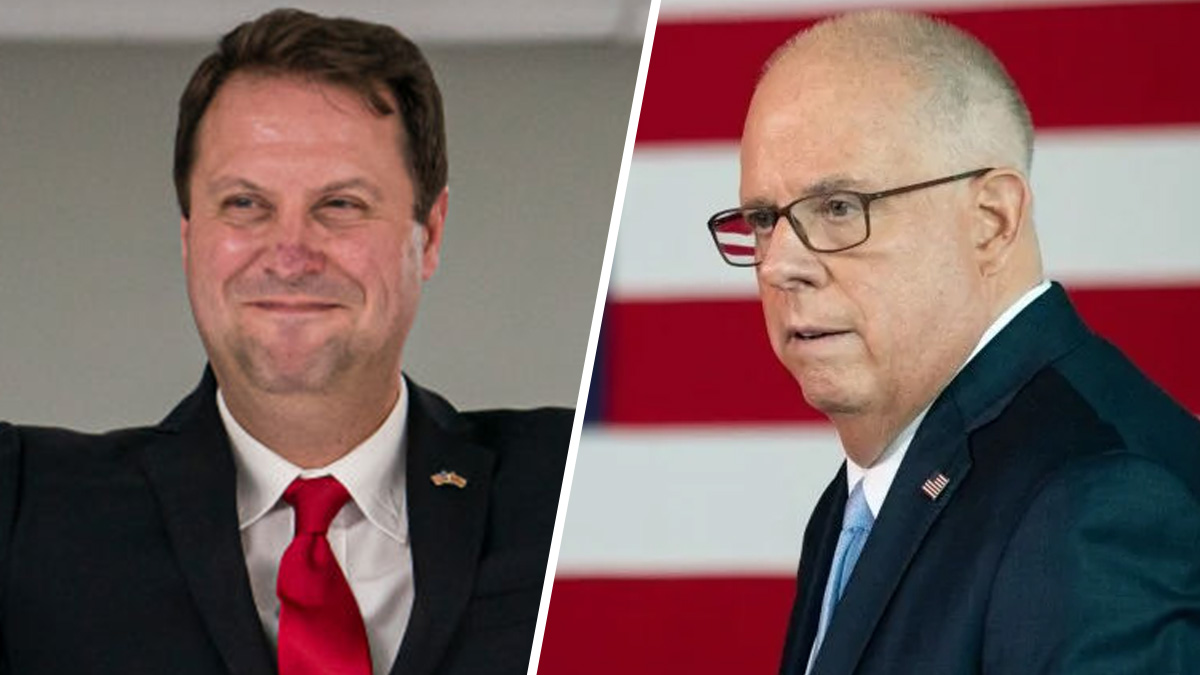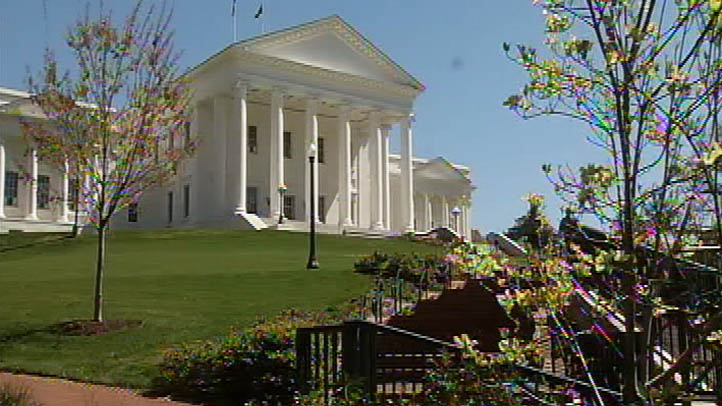It’s the only state in the country that’s embraced all-mail elections, protections for same-sex marriage, and action on climate change... and also chose the Republican in every gubernatorial and presidential election since 1984.
And while Utah probably isn’t in danger of losing its reputation as a GOP stronghold anytime soon, the Beehive State is exhibiting a bit of an independent streak when it comes to traditional binary political debates.
Perhaps most significant: Voters in Utah might choose to support a Senate candidate from neither the Republican nor Democratic parties this fall, and become the first conservative state to send an independent to the Senate in more than 40 years.
“Many people [in Utah] have been Republicans for a long, long time, and they're unwilling to vote for Democrats... however, they are willing to vote independent,” said Evan McMullin, who is running for Senate — without a party — against Republican incumbent Mike Lee.
We're making it easier for you to find stories that matter with our new newsletter — The 4Front. Sign up here and get news that is important for you to your inbox.
McMullin, a former CIA officer and chief policy director for House Republicans, first ran for office in 2016, providing voters in 11 states a third option to Donald Trump and Hillary Clinton. He captured 21.5% of the vote in Utah, just six points behind Clinton.
Now, in 2022, McMullin is running again — with seemingly more momentum, as he tries to knock off one of former president Trump’s closest allies in the Senate. And this time, there will be no other big names on the ballot, with Utah’s Democratic party choosing to support McMullin’s moderate bid, rather than their own progressive candidate.
Does Evan McMullin Actually Have a Chance in Utah?
McMullin is betting his campaign that Trump’s brand of conservatism — often confrontational and controversial — turns off more Republicans in highly religious Utah than in other conservative states.
The former president earned just 45.5% of the 2016 vote in Utah, the smallest share of the electorate among any of the 30 states he won.
And while Trump collected a bigger piece of the Utah pie in 2020, his 58% share of the electorate was still significantly lower than the 68% share that Republican nominees averaged in Utah from 2000 to 2012.
“People assume that if you vote for Trump, that means you were a supporter of everything he said or did,” McMullin said. “And it's just not the case, especially here in Utah.”
LX News spoke with dozens of voters across the state, with a clear theme emerging from those who identified as 2020 Trump voters: They didn’t like a lot of the things the former president said, but chose him because they’ll always choose a conservative over a Democrat.
“Direct and brash and really super honest and crass... for people in Utah, that is not OK,” said Dr. Leah Murray, a political science professor at Weber State, who says you can’t not notice the influence of the Church of Jesus Christ of Latter-day Saints (P.S. - Don’t call them “Mormons”).
“If you're a politician here, you're not really going to score points being mean," Murray said.
She points to the popularity of McMullin’s opponent, Sen. Mike Lee, which has fallen over the years as he went from Trump critic to close Trump ally. In 2016, he won 68% of the statewide vote, but his approval numbers in early 2022 hovered at just 42%.
However, polls for the 2022 Senate race also show McMullin consistently polling in the mid-30s, while Lee has been polling in the 40s, even closer to 50%. Lee, who did not accept numerous LX News interview invitations, also won a contested three-way Republican primary by a convincing margin, with 62% of his party’s vote in June.
What Other "Progressive" Actions Is Utah Taking?
Utah has embraced election reforms that many other Republicans have rejected as “progressive” — or even “woke”:
But Utah’s top elections official says increasing access to ballots — or the state’s openness to tackling climate challenges and advance same-sex marriage protections — aren’t “progressive” notions at all.
“I think we see them as common sense,” Lt. Gov. Deidre Henderson, a Republican, told LX News. “We see them as looking at the human element and making sure that we're focusing on people and not just on politics.”
Regarding the voting reforms, Henderson credits transparency and patience for getting a majority of Utahns on board with them. The state first allowed counties to opt in to an all-mail process in 2014, and nearly every county had chosen to adopt the method by 2020, when lawmakers passed a law requiring no-excuse mail voting statewide.
Utah is following a similar opt-in process now with rank-choice voting.
“We don't like a heavy-handed approach here,” Henderson said. “We take umbrage when the federal government tries to come in and hammer things here. We like to be able to do things our way, and to do things in a pragmatic way, and bring people along with us, rather than force people to do things.”
Utah also passed transparency mandates for lobbyists and foreign agents in its state capitol, and bail reforms for its jails. Some of its recent criminal justice reforms, aimed at lowering prison populations and costs, have appealed to many of the state’s libertarian-leaning conservatives.
Utahns have also been leaders on climate change conversations as well, from elected Republicans in Congress, to the administrators leading the state’s top universities.
All four Utah Republicans in the House also voted to support a nationwide bill protecting the right for same-sex couples to get married.
“Utah is a very conservative state,” Henderson said. “And yet we can work together to find solutions to these problems that typically seem right and left. But here in the state, they're just right or wrong.”
How Much of This Has to Do With The Church?
Both Henderson and Murray identified The Church of Jesus Christ of Latter-day Saints as a leading factor for why Utah Republicans don’t fit the same mold as the traditional southern or midwestern Republican.
“The Church of Jesus Christ of Latter-day Saints gets started in upstate New York, [then] they get kicked out,” Murray details. “They move to Ohio, they get kicked out; they move to Missouri, they get kicked out...
“They remember being treated badly in a way that maybe other Christians faith in this country don't have — that history of being persecuted — and that really can inform the way you relate with politics.”
Murray points out how Republican support among Utah church members — once the most loyal GOP voters in the country — has waned during the Trump years, as Republican support among evangelical Christians has grown, according to Pew.
“Republicans have their own vibe here... very open to immigration, very open to bringing in refugees — especially religious refugees — because that history for them matters,” Murray said.
Murray observed many Utah Republicans are more comfortable with a less-confrontational form of conservatism than former president Trump displayed.
“If you read early accounts of Utahns here,” McMullin said, “there was a sense of community and a commitment to working together to solve problems. And that's still a part of our political culture and our social culture here in Utah.”
So Could Utah Pave the Way for More Third-Party Candidates and Bipartisan Reforms?
Sixty percent of U.S. voters say they want a third political party to break the Democratic and Republican duopoly, according to a recent Suffolk University/USA Today poll. But America’s winner-take-all political system makes it very hard for a third party to emerge.
So instead of focusing on states with a lot of voters stuck in between the two parties, maybe Utah, with its one-party dominance, could provide a different pathway?
“In Utah, Democrats are like endangered species,” Murray said, pointing to their half-century absence in statewide offices. “So Evan McMullin makes the case to the Democratic Party, 'you're going to lose anyway. Why don't you lose voting for me, who's got a shot?'
“So an independent candidate, if they position themselves center/right, there's room... if you can pick up disgruntled Republicans and Democrats who would really like to win something — finally.”
McMullin’s opponent, Lee, has focused more on President Joe Biden and the differences between Republicans and Democrats, than he has on his independent opponent. But Lee has started drawing more of a contrast with McMullin lately.
However, in a state where polls found Republican Sen. Mitt Romney more in-line with voters (51%) than former President Trump (37%), McMullin says he sees an avenue for his politics to rise above partisan bickering.
“Our politics are broken nationally,” McMullin said. “Here in Utah... we know there's a better way. And I think Washington could learn something from that, frankly.”
Finally, McMullin Has to Caucus With Either Republicans or Democrats, Right?
Through dozens of media interviews, McMullin has avoided saying whether he would pick Democrats or Republicans to caucus, lunch and form alliances with.
In fact, he told LX News, if he wins, he’d take the unorthodox step to caucus with neither party — a pledge some say would limit his ability to get deals done in Washington. The only other two independents in Congress — Vermont Sen. Bernie Sanders and Maine Sen. Angus King — both caucus with Democrats.
“I am committed to maintaining my independence in the Senate,” McMullin said. “In a Senate that's as closely divided as this likely will be... we will have one of the most — if not the most — important votes in the Senate.”
McMullin wouldn’t say, if he had the deciding vote next January, if he’d choose to put Mitch McConnell (R-Ky.) or Chuck Schumer (D-N.Y.) in charge of the Senate, just that he’d “work with whomever” will allow him to advance as many of his priorities as possible.
In late August, Club for Growth, a Republican advocacy group, reportedly committed $2.5 million to running anti-McMullin ads in Utah, hitting the former Republican for now wanting to “push a left-wing agenda.”
McMullin and Lee are set to debate in person Oct. 17.
Noah Pransky is LX News’ National Political Editor, covering Washington and state politics, with a special focus on young voters. His political and investigative work has been honored with national Murrow, Polk, duPont, and Cronkite awards, and you can contact him confidentially at noah.pransky@nbcuni.com, or on Facebook, Instagram or Twitter.
LX News’ Beth Peak contributed to this story.



